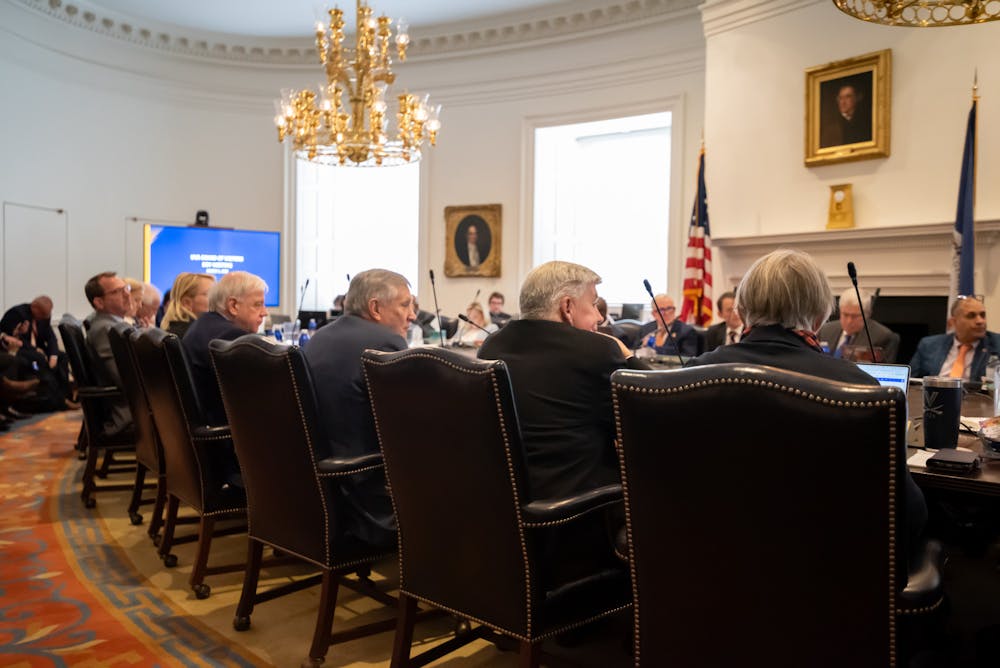The Finance Committee approved the University’s operating budget for the 2024-25 fiscal year, as well as revised plans for the 2024 Major Capital Projects, in their meeting Friday. The Committee also had briefly discussed diversity, equity and inclusion-related expenditures anticipated in the upcoming fiscal year.
The Committee unanimously approved the University’s total operating budget for the upcoming fiscal year — a total of approximately $5.8 billion, a 7.14 percent increase from the previous year’s budget of approximately $5.4 billion. Within this total budget, the Committee approved allocations into three separate categories — the Academic Division, the University Medical Center and the College at Wise, which received $2.40 billion, $3.28 billion and $75.50 million respectively. The approved Academic Division budget marks a 6.8 percent increase from the previous year’s budget of $2.3 billion, with the Medical Center and College at Wise budgets also increasing by 8.3 percent and 5.1 percent respectively.
According to Jennifer “J.J.” Wagner Davis, executive vice president and chief operating officer, the University is in a strong financial position overall. Davis said the University is one of only four universities in the nation to maintain a AAA bond rating — signifying an institution’s ability to repay bonds it issues and its overall financial wellbeing — from all three major credit rating agencies.
“We continue to be in a really strong financial position,” Davis said. “We don’t take [the AAA bond rating] lightly.”
Davis also said that stable enrollment with high student demand also represents the University’s strong financial position, and that the University’s endowment fund contributes substantially to driving down student tuition costs. According to Davis, without the endowment, base in-state tuition would need to increase by approximately 41%.
Amidst discussion of the budget, Board Member Douglas D. Wetmore asked Davis what the DEI budget is for the upcoming year, referencing the “public controversy” surrounding the University’s DEI spending that began after the nonprofit organization OpenTheBooks released a report alleging that the University currently pays 235 DEI-related employees, for a total of $20 million in DEI spending.
According to Davis, the DEI-related budget over the next fiscal year is $7.486 million, which includes funding for the Office for Equal Opportunity and Civil Rights — an office that conducts cases on complaints made regarding discrimination, as well as outreach and education to ensure equal opportunity and protect civil rights, according to their website. Davis also said that caseloads within this office have been growing, prompting conversation during the budget-crafting process and leading to an increase for this budget item in this year’s operating budget.
“[The growing caseload] was a significant conversation through the budget process, because being out of compliance with [EOCR regulations] would be wildly problematic,” Davis said.
In addition to approving the operating budget, the Committee approved financial plans for the University’s Major Capitol Plan, which contains major construction or renovation projects in progress at the University and is revised by the Board’s Buildings & Grounds Committee annually to add or remove projects.
The two largest of these projects were the Darden Student Housing project and the Focused Ultrasound Expansion. According to Davis, the Darden Student Housing project — which will create residential spaces for students enrolled in MBA programs at the Darden School of Business — has a total budget of $155 million.
Davis also said the Focused Ultrasound Expansion — which the University hopes will expand U.Va. Health’s use of focused ultrasound technology — will have a budget of $16.5 million. This technology is used to treat a range of conditions, including epilepsy and prostate cancer, according to U.Va. Health.
The Finance Committee will reconvene at the Board’s September meeting.







